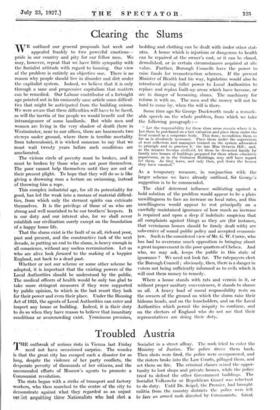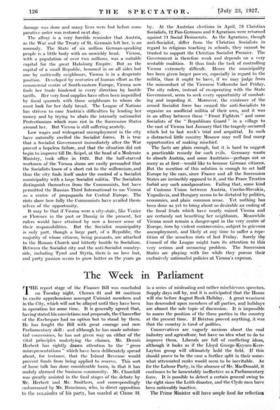Troubled Austria
THE outbreak of serious riots in Vienna last Friday -I-. need not have occasioned surprise. The wonder is that the great city has escaped such a disaster for so long, despite the violence of her party conflicts, the desperate poverty of thousands of her citizens, and the unconcealed efforts of Moscow's agents to promote a Communist revolution.
The riots began with a strike of transport and factory workers, who then marched to the centre of the city to demonstrate against what they regarded as an unjust ver lict acquitting three Nationalists who had shot a Socialist in a street affray. The mob tried to enter the Ministry of Justice. The police drove them back. Then shots were fired, the police were overpowered, and the rioters broke into the Law Courts, pillaged them, and set them on fire. The criminal classes seized the oppor- tunity to loot shops and private houses, while the police tried to defend the other Government buildings. The Socialist Volkswehr. or Republican Guard was reluctant to do duty. Until Dr. Seipel, the Premier, had brought militia from the country districts the police were left to face an armed mob directed 'by Communists. Great damage was done and many lives were lost before com- parative order was restored next day.
The affray is a very forcible reminder that Austria, as the War and the Treaty of St. Germain left her, is an anomaly. The State of six million German-speaking • people is a little ,body with an unwieldy head. Vienna, with a population of over two millions, was a suitable capital for the great Habsburg Empire: But as the capital of a small Republic, hemmed in on all sides but one by unfriendly neighbours, Vienna is in a desperate position. Developed by centuries of human effort as the commercial centre of South-eastern Europe, Vienna now finds her trade hindered in every direction by hostile tariffs. Her veryfood supplies have often been imperilled by fiscal quarrels with those neighbours to whom she must look for her daily bread. The League of Nations has striven to ease Austria's difficulties by lending her money and by trying to abate the intensely nationalist Protectionism which runs riot in the Succession States around her. But Vienna is still suffering acutely.
Low wages and widespread unemployment in the city • have naturally swelled the Socialist forces. It is true that a Socialist Government immediately after the War proved a hopeless failure, and that the situation did not begin to improve till Dr. Seipel, at the head of a Moderate Ministry, took office in 1922. But the half-starved workmen of the Vienna slums are easily persuaded that the Socialists know of a short cut to the millennium, and thus the city finds itself under the control of a Socialist municipality with a large Socialist militia. The Socialists distinguish themselves from the Communists, but have permitted the Russian Third International to use Vienna as a centre of propaganda for Central Europe. The riots show how fully the Communists have availed them- selves of the opportunity.
It may be that if Vienna were a city-state, like Venice or Florence in the past or Danzig in the present, her rulers would have attained by now a keener sense of their responsibilities. But the Socialist municipality is only part, though a large part, of a Republic, the majority of whose citizens, being peasants, are attached to the Roman Church and bitterly hostile to Socialism. Between the Socialist city and the anti-Socialist country- side, including Tyrol and Styria, there is no love lost, and party passion seems to grow hotter as the years go by. At the Austrian elections in April, 73 Christian Socialists, 12 Pin-Germans and 9 Agrarians were returned against 71 Social Democrats. As the Agrarians, .though anti-Socialist, differ from the Christian Socialists in regard to religious teaching 'in schools,_ they cannot be trusted to support the Christian Socialist Premier. The Government is therefore weak and depends on, a very unstable coalition. It thus finds the task of controlling Vienna extremely. difficult. Hence the municipality has been given larger pow y+rs, especially in regard to the militia, than it ought to have,' if we may judge from the misconduct of the Viennese Volkswehr last Friday. The city rulers, instead of co-operating with the State Government, seem to seek every opportunity of combat- ing and impeding it. Moreover, the existence of the armed Socialist force has caused the anti-Socialists to organize an unofficial militia of their own, and it was in an affray between these " Front Fighters " and some Socialists of the " Republican Guard "' in a village to the east of Vienna last January that the tragedy occurred which led to last week's trial and acquittal. In such a distracted little country Moscow may well find many opportunities of making mischief.
The facts are plain enough, but it. is hard to 'suggest a practicable remedy for such evils. .Germany wants to absorb Austria, and some AuStrians—perhaps not so many as at first—would like to become German- citizens. But the mention of this solutiOn is enough to set half Europe by the ears, since France and all the Succession States are invincibly opposed to it, and the Peace Treaties forbid any such amalgamation. Failing that, some kind of Customs Union betiveen Austria, . Czecho-Slovakia, Yugoslavia, and Hungary seems to be dictated by politics; economics, and plain common sense. Yet nothing has been done as yet to bring about so desirable an ending of the fiscal fends which have nearly ruined Vienna and are certainly not benefiting her neighbours. Meanwhile Vienna must remain a danger-spot in the very centre of Europe, torn by violent controversies, subject to grievous unemployment, and 'likely at 'any time to suffer a repe- tition of the' senseless riots of last Friday. Surely the Council of the League might turn its attention to this very serious and menacing problem. The Succession States are playing with fire while they pursue their exclusively nationalist policies at. Vienna's expense.























































 Previous page
Previous page